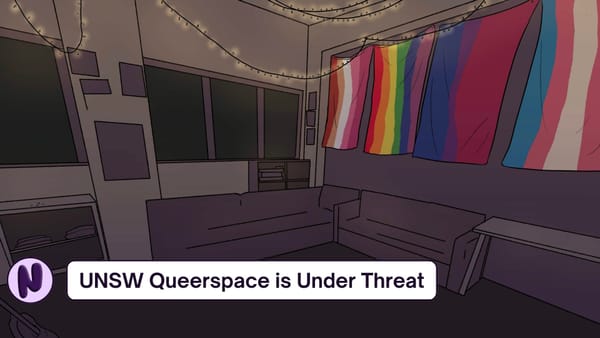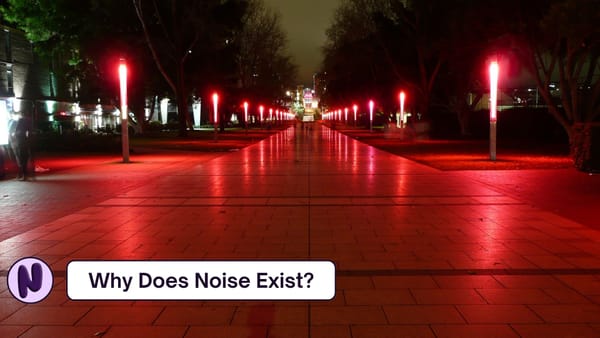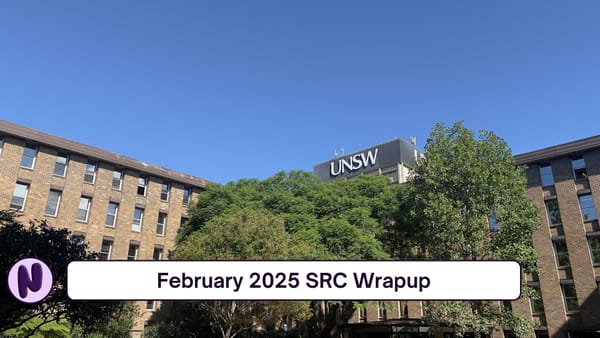Where’s the support for international students?
Your student representatives are spending your SSAF funds protesting about everything except the issues directly faced by students.

For the last 43 weeks, UNSW’s “activist community” has been protesting the complicity of the Federal government in the invasion of Gaza. Paid members of the SRC have diverted funding away from other initiatives to print posters, paint banners, hire spaces, put forward motions about condemning the government for every dollar spent and deal signed, and joined the largest occupation of a university campus in the Southern hemisphere since the Vietnam War. Over 43 weeks, hundreds of dollars of funding, of your SSAF fees, have been spent on this activism.
In the meantime, the Federal government has created the largest existential threat to students and universities since VSU (Voluntary Student Unionism) in 2006. Since December, nine separate changes have been made to the rules affecting international students, with more slated in the coming months. Until now, the most egregious was an increase in visa fees to nearly double of the next highest globally, ostensibly designed to block “non-genuine students”, but instead providing a massive advantage to European and North American students, to the detriment of the rest of the world. The effects of this change are already visible: student visas in Q2 2024 have fallen to the lowest level since 2005 (excluding 2020 and 2021 border closure years).
Earlier this week, an amendment to the Education Services for Overseas Students (ESOS) Act was leaked online, demonstrating the government’s intent to cap international student numbers at 40% of the student body starting January 2025, giving universities effectively 2 months to determine how many international students to accept for 2025, and how many domestic offers they can afford to send out. These caps don’t replace the existing caps on the number of international students for each course, but instead add another layer of restriction on Australian universities, and another difficulty for international students attempting to study here.
Despite the hostility of these changes towards international students, the SRC has been effectively silent on the issue. A motion condemning the Federal budget in June’s SRC meeting was conspicuously missing any mention of the changes affecting international students, despite most of these changes being presented for the first time in that budget. When questioned, the members of the SRC who wrote it claimed that a motion specifically on the issues faced by international students was in the works, and would appear in the July meeting. Despite being able to find time for motions on Palestine and Peter Dutton’s nuclear plan, the mover still didn’t manage to put together a motion on the issues for international students.
I’d love to know what goes through the minds of SRC representatives when they choose which issues to take up. Hundreds of dollars of UNSW student-provided SSAF funding has been spent this year on the Gaza solidarity encampment (protesting the University of Sydney’s ties to Israel), on solidarity actions for the recent protests in Bangladesh (where student-led anti-government protests successfully brought an end to a discriminatory political regime), on protesting a joke nuclear policy by a party that won’t be in power until at least 2026, and yet the existential threat posed by cutting international student numbers has been completely ignored.
It’s not just the inaction from protest-first activists that’s damning. Several members of the SRC are also Labor party staffers and high level members of NSW Young Labor, and yet we’ve heard next to nothing from them on the issue. When the students you’re elected to represent are being put in harm’s way by your bosses, why do the members of the party that claims to be “working for Australia” refuse to work for the people they’re elected to represent? It paints a terrifying picture of their future careers in real political office, when they know they’ll hold their seats for 4 years rather than 1.
Should anyone be surprised though? After all, despite over 27,000 international students being enrolled in 2023, less than 900 voted in the SRC election (3.3%, compared to 4% across the university) last year. The current SRC, composed of 27 people, has less than 10 international students, despite the fact that 2 seats are reserved for international students. Of those 2 positions, the International Students Officer has been notably absent from every meeting this year and has been unreachable by the rest of the SRC since his election in December, despite taking home thousands of dollars of pay in that time. In addition, not one of UNSW’s delegates to the National Union of Students was an international student. The SRC seems to have no interest in the trust of UNSW’s international student base, and international students have no reason to believe that the SRC will support them.
UNSW isn’t the only university where student representatives have sidelined the international student community. Earlier this week at the University of Sydney, the SRC held a Student General Meeting to condemn the actions of the Israeli government in Gaza. Meanwhile, the mainstream press was publishing a series of articles on the damage the ESOS changes would have to their university (including the potential removal of over 12000 international students). The loudest voice from the University has been the student publication Honi Soit, which has been reporting on the changes since they were originally announced in the budget. In speaking to a member of their editorial team, they stated that “The focus on the CAP (Campus Access Policy), Palestine, adjacent issues like the backlash against Senator Payman, and international solidarity more broadly has been placed above any meaningful advocacy on the impending caps so far. If you ask members of the SRC, like I have, they will condemn the caps as racist and inflammatory but a motion on the subject has yet to be raised in an SRC meeting. The International Student Officers rarely engage with other factions and have not spoken in council so far this year.”
In slightly more positive news, the postgraduate bodies have been more proactive on this front, forming a new International Students Representative Council and providing a submission to the Senate Inquiry into the ESOS bill. In the words of SUPRA (Sydney University Postgraduate Representative Association) education officer Weihong Liang, “We may focus on the new policy that does not allow student visa holders to apply for a working visa on a short-term basis. This is not fair for people who want to do research with work experience: it is really common for people to work for 2-3 years and then return to campus to do research. This will be one of our focus areas in the next steps.”
I’m honestly not sure what the solution here is. It’s a weird time to be an advocate when the executives of UNSW are lobbying Parliament to protect students, while the representatives elected to defend the rights of marginalised students have consistently chosen to ignore the issue entirely. I’m fully aware that I’m complicit in this as a member of the SRC, but I’ve taken steps to start addressing the issues in the channels that are available to me, including compiling feedback from students for the upcoming meeting of UNSW Council, engaging with other student publications on how to best protest the new policy, and the long-awaited motion to the SRC for the next meeting in September.
If you’re a student, alumni, staff member, or someone in the wider community (whether or not you’ve been to UNSW), I’d love to hear your thoughts on this issue. Please reach out to me via email: [email protected] (or in the comments section below)! I believe that the best way to be a representative is to talk to the people affected by an issue, and we have a rare alignment of the stars where the people with influence (university vice-chancellors) are actively supporting actions in the best interest of students.
If you’re interested in learning more about this issue, Professor Andrew Norton from ANU’s Migration Hub has written an amazing piece of research about this policy decision, as well as a simplified version in The Conversation. Edward and Angus from Honi Soit have also produced a really helpful explainer on how the changes will affect the financial side of higher education in Australia, and Luke from the Noise team wrote a pair of articles earlier this year discussing the wider changes in the budget.




